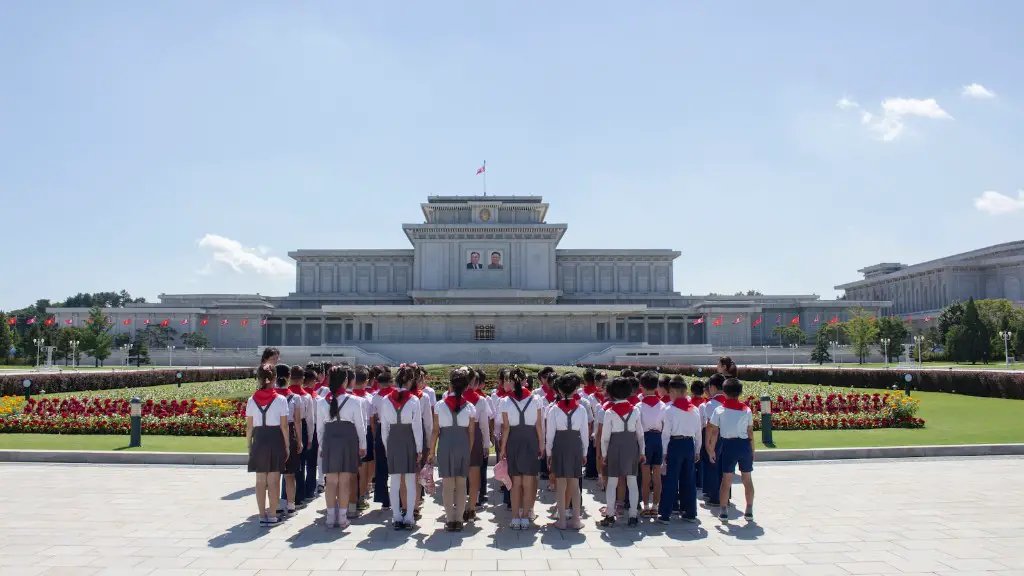The question of whether North Korea has the capability of launching a nuclear weapon powerful enough to reach us has been a source of intrigue and worry for decades. The reclusive state has long posed a threat to its neighbor South Korea, and the prospect of a nuclear strike against us is a sobering one.
In recent years, the country has shown signs of technological advancement in missile technology, and its continued efforts to build long-range intercontinental ballistic missiles (ICBMs) have raised serious concerns about its nuclear capabilities. North Korea has already tested two ICBMs that are theoretically capable of reaching the U.S. mainland, and experts say it has the necessary technology and resources to target the continental United States with nuclear weapons.
Some analysts believe that North Korea’s testing of ICBMs signals a worrying development in the country’s nuclear capabilities: the ability to strike the U.S. mainland with nuclear weapons. This could be hugely dangerous, as it would drastically alter the traditional balance of power in the region. Furthermore, it could lead to a massive arms race between North Korea, the US and its allies, further escalating the tensions in the region.
There is an ongoing debate among experts as to the accuracy of North Korea’s current ICBM technology. Some argue that the missiles tested have been unreliable and may not be able to successfully reach mainland U.S. However, other experts maintain that even if inaccurate, the risk of a nuclear strike from North Korea is still real and must be taken seriously.
The Trump administration has adopted a hard line approach to dealing with North Korea’s nuclear ambitions, imposing heavy economic sanctions on the country and attempting to diplomatically isolate it from the rest of the world. Despite this approach, the country has stubbornly refused to abandon its nuclear ambitions and the threat of a nuclear attack still looms.
It is clear that North Korea has the potential to reach the U.S. mainland with a nuclear weapon, and this prospect is something that must be taken into account when assessing the risk of a nuclear attack. However, it is important to remember that an attack is not inevitable, and the U.S. and its allies have a variety of measures in place to defend against such a threat.
Nuclear Deterrents
The potential threat of a nuclear strike from North Korea is a worrying one, but the U.S. has in place a variety of nuclear deterrents that could help to protect it in the event of an attack. The U.S. maintains the world’s largest nuclear arsenal, with nearly 7,000 nuclear weapons in its arsenal, and has the means to launch a devastating retaliatory strike in the event of a North Korean strike.
The U.S. also maintains a network of early warning satellites as part of its missile defense system that could detect any incoming ICBMs from North Korea in time for an effective counter-strike. Furthermore, the U.S. has an extensive network of ground-based antimissile defense systems in place, such as the THAAD system, that could potentially intercept any incoming missiles.
These measures provide some assurance that the U.S. would be able to protect itself from a nuclear attack from North Korea, should one occur. However, the risk of a successful attack is real and must still be taken into account when assessing the overall threat posed by the Pyongyang regime.
U.S. Policy on North Korea
The Trump administration has taken an aggressive stance towards North Korea, seeking to diplomatically isolate the country and pressure it into halting its nuclear ambitions. This approach has so far had little success, and North Korea has remained defiant in the face of U.S.-led sanctions.
The sanctions have had a significant impact on North Korea’s economy, but they have done little to deter the country’s leaders from pursuing their nuclear ambitions. Some analysts argue that the U.S. should adopt a softer approach to dealing with North Korea, engaging them in dialogue and offering incentives for the country to give up its nuclear weapons.
The effectiveness of the U.S.’s current policy on North Korea is debatable, but it is clear that the risk of a nuclear attack from Pyongyang remains a top priority for the Trump administration. In light of this, the U.S. must continue to pursue a course of action that will help to prevent any such attack while still protecting its own interests and those of its allies.
International Response
The threat of a nuclear strike from North Korea has generated a great deal of international concern. Many countries have called for increased diplomatic pressure to be placed on Pyongyang to abandon its nuclear ambitions, and the UN Security Council has imposed a series of sanctions in an effort to deter the country from pursuing its nuclear program.
The international response to the threat from North Korea has been largely unified. Countries from around the world have sent political, economic and military aid to South Korea, and the U.S. has worked to build a coalition of nations to support its efforts to contain the North Korean threat.
The international response has been largely successful in containing the threat of a nuclear strike from North Korea, but it is clear that the situation is far from resolved. The North Korean regime is still pursuing its nuclear ambitions, and the international community must remain vigilant in its efforts to prevent any attack.
North Korean Motivations
It is unclear why North Korea has continued to pursue its nuclear ambitions in the face of international condemnation and sanctions. Some analysts believe that the country’s leaders are motivated by the desire to increase their own power and prestige. By possessing nuclear weapons, they can maintain a certain degree of deterrence against their enemies and ensure their own survival in the face of military action.
Others argue that the North Korean regime is pursuing nuclear weapons as a bargaining chip to gain economic aid and political leverage on the international stage. This could be done as a means of ensuring the survival of the regime in the face of increasing economic and political pressure from the U.S. and its allies.
Regardless of the reason, it is clear that the North Korean nuclear threat is a serious one and must be taken seriously by the international community. The U.S. and its allies must remain vigilant in their efforts to contain the threat and prevent any potential attack.
Potential Solutions
The threat of a nuclear strike from North Korea is a real and growing one, and the international community must act to prevent any such attack. There is no easy solution to the problem, but there are a variety of diplomatic and economic measures that could be taken to help contain the threat.
The U.S. and its allies should continue to engage North Korea in dialogue and attempt to diplomatically isolate the country further, while also offering incentives for the country to abandon its nuclear ambitions. There should also be increased economic pressure placed on Pyongyang, including further sanctions, to punish the country for its continued pursuit of nuclear weapons.
Furthermore, the international community should look to increase its military presence in the region. This could be done through the deployment of U.S. and allied troops, as well as the strengthening of regional missile defense systems. These measures could help to deter any potential attack from North Korea and ensure the safety of the region.
Ultimately, the threat of a nuclear strike from North Korea is a serious one and must be taken seriously by the international community. Only through a unified and concerted effort can the threat be contained and an attack prevented.





